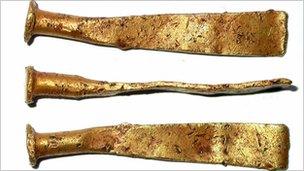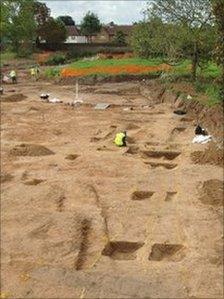Roman settlement unearthed in Syon Park, west London
- Published
A Roman settlement filled with ancient artefacts and human remains has been found on a west London building site.
Archaeologists excavating the listed Syon Park site made the discovery of more than 11,000 Roman items just half a metre below the ground.
They were digging on the land ahead of the construction of a new hotel on the outskirts of the historical Syon Park Estate, near Brentford.
Part of one of Roman Britain's most important roads was also found.
'Extremely fortunate'
About 11,500 fragments of pottery, 100 coins and jewellery were uncovered by the experts from the Museum of London Archaeology.
Jo Lyon, a senior archaeologist at the museum, said: "We were extremely fortunate to discover such a comprehensive repertoire of Roman finds and features so close to the surface.
"They tell us a great deal about how the people of this village lived, worked and died.
"It helps us build a picture of the Roman landscape and shows how the busy metropolis of Londinium connected with the rest of Roman Britain."
The site was excavated in 2008, but the fascinating discoveries have only now been revealed.
Archaeologists said the Roman settlement had remained remarkably undisturbed for almost 2,000 years.

Part of a late Bronze Age gold pennular ribbon bracelet was found at Syon Park
A section of one of Roman Britain's most important roads was revealed, linking Londinium with the Roman town of Silchester and an ancient tributary of the Thames.
The artefacts found included two shale armlets, fragments of a lava quernstone and a late Bronze Age (1000-700 BC) gold bracelet.
Ms Lyon said her most exciting find was more than 100 Roman coins.
"It was so nice to find so many lost coins. They were scattered along the Roman Road, dated to different years across the period."
'Remarkable history'
Post excavation manager at the museum Julian Hill explained why it took more than two years between the excavation and announcing what was found.

About 10 archaeologists took about two months to excavate the site
"The process took so long because it was important that we went through the data in correct sequence," said Mr Hill.
"There was lots of raw data when we came off site. We need to rebuild the sequence of the excavation from the bottom up.
"It's rare to get this sort of stuff surviving in a relatively undisturbed state," Mr Hill added.
"So far, only the site where the hotel is to be built has been excavated.
"Given the amount that we found, it is quite possible that more will be found in the area nearby."
The Duke of Northumberland, whose family has held residence at Syon Park for more than 400 years, said: "Syon Park has a rich and remarkable history.
"The Roman findings are an incredible addition to this legacy and emphasise Syon Park's place as a prominent landmark in ancient British history."
Some of the historical finds are expected to go on display at the hotel which is due to open at the site next year.
- Published16 September 2010
- Published8 September 2010